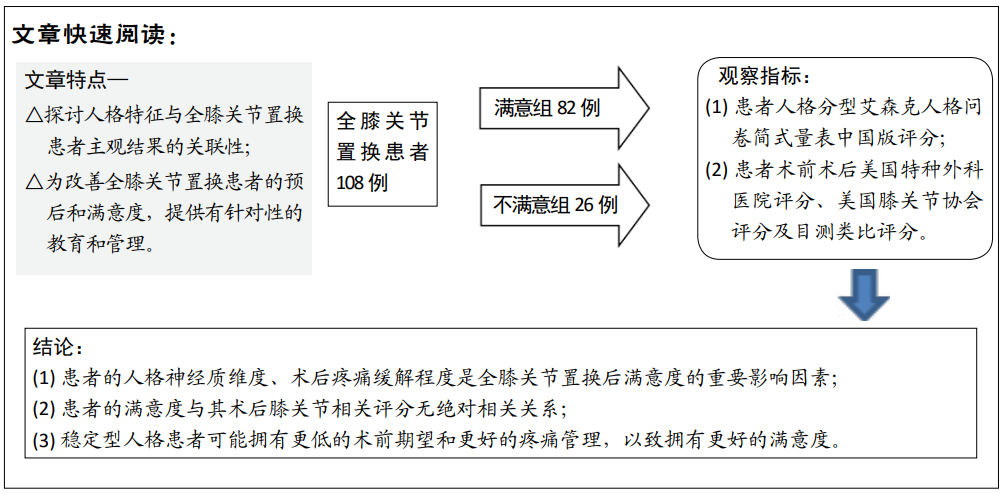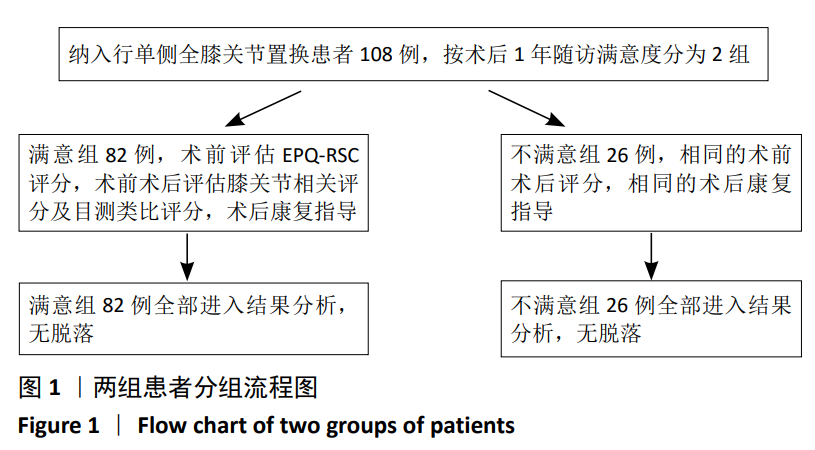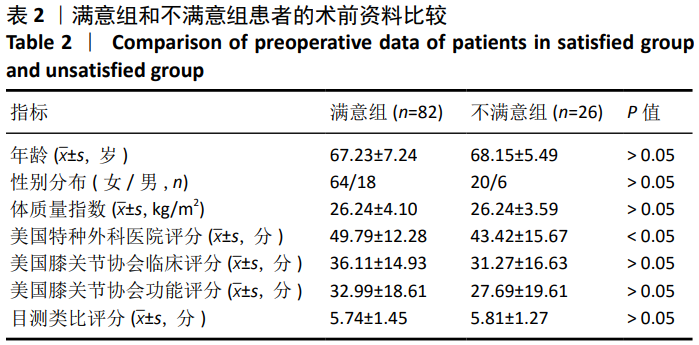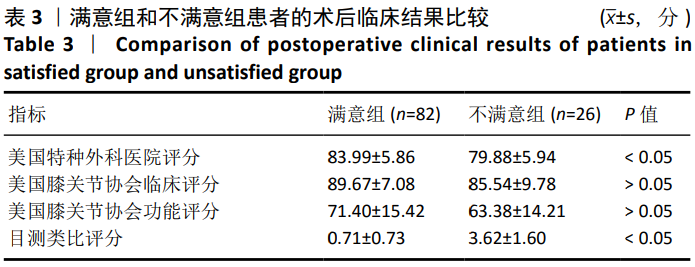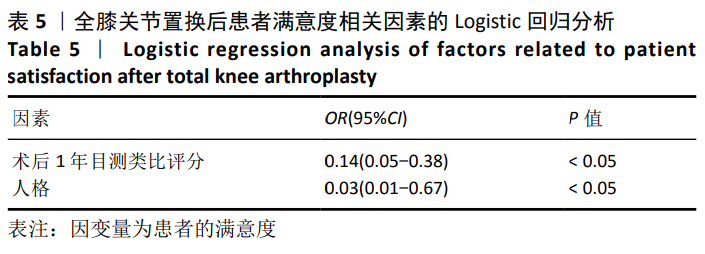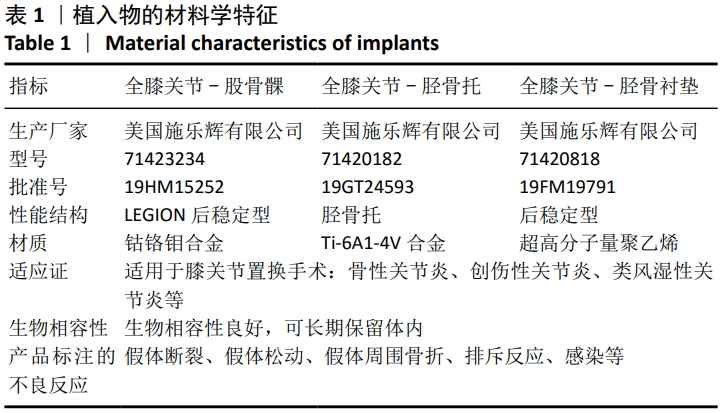[1] SCOTT CE, HOWIE CR, MACDONALD D, et al. Predicting dissatisfaction following total knee replacement: a prospective study of 1217 patients. J Bone Joint Surg Br. 2010;92(9):1253-1258.
[2] BOURNE RB, CHESWORTH BM, DAVIS AM, et al. Patient satisfaction after total knee arthroplasty: who is satisfied and who is not? Clin Orthop Relat Res. 2010; 468(1):57-63.
[3] DUNBAR MJ, RICHARDSON G, ROBERTSSON O. I can’t get no satisfaction after my total knee replacement: rhymes and reasons. Bone Joint J. 2013; 95-b(11 Suppl A): 148-152.
[4] VON KEUDELL A, SODHA S, COLLINS J, et al. Patient satisfaction after primary total and unicompartmental knee arthroplasty: an age-dependent analysis. Knee. 2014;21(1):180-184.
[5] MATSUDA S, KAWAHARA S, OKAZAKI K, et al. Postoperative alignment and ROM affect patient satisfaction after TKA. Clin Orthop Relat Res. 2013; 471(1): 127-133.
[6] BARRACK RL, RUH EL, CHEN J, et al. Impact of socioeconomic factors on outcome of total knee arthroplasty. Clin Orthop Relat Res. 2014;472(1): 86-97.
[7] SCHNURR C, JARROUS M, GÜDDEN I, et al. Pre-operative arthritis severity as a predictor for total knee arthroplasty patients’ satisfaction. Int Orthop. 2013;37(7):1257-1261.
[8] ELSAMADICY AA, KEMENY H, ADOGWA O, et al. Influence of racial disparities on patient-reported satisfaction and short- and long-term perception of health status after elective lumbar spine surgery. J Neurosurg Spine. 2018;29(1):40-45.
[9] KOOREVAAR AML, HEGEMAN JM, LAMERS F, et al. Big Five personality characteristics are associated with depression subtypes and symptom dimensions of depression in older adults. Int J Geriatr Psychiatry. 2017; 32(12):e132-e140.
[10] HAMILTON DF, LANE JV, GASTON P, et al. What determines patient satisfaction with surgery? A prospective cohort study of 4709 patients following total joint replacement. BMJ Open. 2013; 3(4):e002525.
[11] LEE G, LEE JS, KIM JH, et al. Impact of Patient’s Pain and Fatigue on Decision of Discharge After Laparoscopic Surgery for Colorectal Cancer. Ann Coloproctol. 2019;35(4): 209-215.
[12] SINGH JA, O’BYRNE MM, COLLIGAN RC, et al. Pessimistic explanatory style: a psychological risk factor for poor pain and functional outcomes two years after knee replacement. J Bone Joint Surg Br. 2010; 92(6): 799-806.
[13] EYSENCK SB, EYSENCK HJ. Impulsiveness and venturesomeness: their position in a dimensional system of personality description. Psychol Rep. 1978;43(3 Pt 2):1247-1255.
[14] 钱铭怡,武国城,朱荣春, 等.艾森克人格问卷简式量表中国版(EPQ-RSC)的修订[J].心理学报,2000,32(3):317-323.
[15] SU H, CAO J, ZHOU Y, et al. The mediating effect of coping style on personality and mental health among elderly Chinese empty-nester: A cross-sectional study. Arch Gerontol Geriatr. 2018;75:197-201.
[16] LI H, ZOU Y, WANG J, et al. Role of Stressful Life Events, Avoidant Coping Styles, and Neuroticism in Online Game Addiction among College Students: A Moderated Mediation Model. Front Psychol. 2016;7:1794.
[17] HUANG L, ZHANG Y, YAO YC, et al. Effects of Personality and Psychological Acceptance on Medical Workers’ Occupational Stress. Zhonghua Lao Dong Wei Sheng Zhi Ye Bing Za Zhi. 2018;36(7): 519-522.
[18] 许丹阳,杨智辉,陈慧.初中生的自悯在人格、自尊与社会性体格焦虑关系中的中介作用[J].中国心理卫生杂志,2017,31(10): 809-814.
[19] SATO T. The Eysenck Personality Questionnaire Brief Version: factor structure and reliability. J Psychol. 2005;139(6):545-552.
[20] INSALL JN, DORR LD, SCOTT RD, et al. Rationale of the Knee Society clinical rating system. Clin Orthop Relat Res. 1989;(248):13-14.
[21] CARLSSON AM. Assessment of chronic pain. I. Aspects of the reliability and validity of the visual analogue scale. Pain. 1983; 16(1): 87-101.
[22] FRANKLIN PD, LI W, AYERS DC. The Chitranjan Ranawat Award: functional outcome after total knee replacement varies with patient attributes. Clin Orthop Relat Res. 2008;466(11): 2597-2604.
[23] ZHANG L, FU T, ZHANG Q, et al. Effects of psychological interventions for patients with osteoarthritis: a systematic review and meta-analysis. Psychol Health Med. 2018;23(1):1-17.
[24] NOBLE PC, CONDITT MA, COOK KF, et al. The John Insall Award: Patient expectations affect satisfaction with total knee arthroplasty. Clin Orthop Relat Res. 2006; 452: 35-43.
[25] KIYAK HA, MCNEILL RW, WEST RA, et al. Predicting psychologic responses to orthognathic surgery. J Oral Maxillofac Surg. 1982; 40(3): 150-155.
[26] MOJS E, ZIARKO M, KACZMAREK L, et al. Anxiety level and its determinants in rheumatoid arthritis patients. Chir Narzadow Ruchu Ortop Pol. 2011; 76(4): 219-224.
[27] ANAKWE RE, JENKINS PJ, MORAN M. Predicting dissatisfaction after total hip arthroplasty: a study of 850 patients. J Arthroplasty. 2011; 26(2): 209-213.
[28] IBRAHIM MS, ALAZZAWI S, NIZAM I, et al. An evidence-based review of enhanced recovery interventions in knee replacement surgery. Ann R Coll Surg Engl. 2013;95(6):386-389.
[29] MCGREGOR AH, RYLANDS H, OWEN A, et al. Does preoperative hip rehabilitation advice improve recovery and patient satisfaction? J Arthroplasty. 2004;19(4):464-468.
[30] HERNANDEZ SK, MAUGER PA. Assertiveness, aggressiveness and Eysenck\”s personality variables. Pers Individ Dif.1980;1(2):143-149. |
